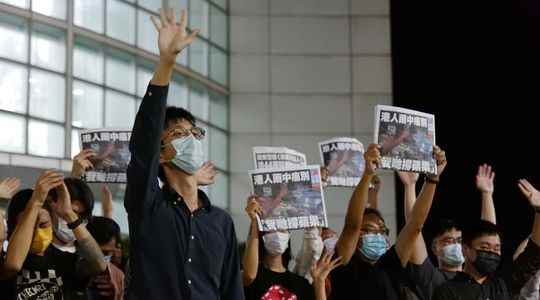Hong Kong has long been considered the journalistic heart of Asia, spearheading press freedom in the region. Its geographical position and unique political system had attracted the offices of the New York Times, AFP, CNN, or even Reuters. It is also the reckless spirit of local journalists, described as “faster than Westernersby former Chinese leader Jiang Zemin, who had contributed to the prosperity of the sector.
“Today, I wouldn’t advise anyone to be a journalist in Hong Kong,” said Stacey Tsui, a 30-year-old local reporter. Exiled to Europe for a few months, she decided to “take a break abroad” to recover from two years that endangered her profession, as well as her future. In response to the giant protests in 2019, Chinese authorities imposed a national security law on Hong Kong in June 2020. This law targets “terrorism”, “secession”, “sedition” and “foreign interference”, so many crimes whose definition is sufficiently vague to be exploited against civil society.
Editor-in-chief sacked
Stacey Tsui was quick to feel the noose tightening: her main employer, Radio Television Hong Kong (RTHK), did not renew her contract in 2021, after a spectacular editorial takeover. The city’s only public radio and television station, once acclaimed for its critical positions, it had been accused of bias against the government by pro-Beijing politicians, before turning around under duress. Its editor, Leung Ka-wing, was sacked six months before his retirement and replaced by Under-Secretary for Home Affairs Patrick Li Pak-chuen. Our witness, who worked for political broadcasts, therefore found herself unemployed: “When the editorial line is imposed and controlled by the government, we no longer need journalists to do critical work”, sighs. she.
Chaining the freelancers, she attended live, via a streaming video, the search of the editorial staff of the daily Apple Daily, a few months later, accused of undermining national security. The closure of the city’s most widely read pro-democracy newspaper in June 2021 was followed, six months later, by the forced closure of another newspaper that employed Stacey, the Booth News. “I understood that I had participated in their very last edition by discovering the images of the handcuffed editors, on social networks, she says. I was upset.” Even today, the emotion remains strong when she evokes this scene.
A few weeks later, at the start of 2022, it’s the Citizen News which stops its operations voluntarily, “for the safety of its employees”. The young journalist realized the obvious: “the” white terror ” [NDLR : une expression renvoyant à la répression politique] was spreading”. This is also confirmed by the latest report from the International Federation of Journalists, which notes that Hong Kong has become a “city of fear” where debate is “stifled”.
“When I interviewed people for television and they said something that could harm them, I felt extremely bad, explains Stacey. “Should I stop them? Blur their faces? Destroy video file? I can send people to jail if I’m not careful enough, or even end up in jail myself.”
Self-censorship
President of the city’s Foreign Correspondents’ Club and director of the school of journalism at the University of Hong Kong, Keith Richburg has seen how the new security law has changed the profile of candidates. “Since 2020, there has been an increase in the number of applications from mainland Chinese, and a sharp drop in those from Western and local students.”
If he thinks that “the disastrous management of Covid-19” is partly to blame, this experienced professional is convinced that young people no longer perceive Hong Kong as a safe city for journalism. “Hong Kong high school students are discouraged from pursuing a career in journalism here, and they go overseas.” In this repressive climate, hundreds of Hong Kong journalists find themselves unemployed. “We lost theApple Dailythe Booth News and the Citizen News, recalls Keith Richburg. Three big newsrooms that can no longer hire local students.”
“Without opposition newspapers, there are no more journalists to ask the angry questions,” he said. This results in uncritical articles dictated by self-censorship. The public is not fooled: a study conducted by Hang Seng University from February shows that 20% of pro-democracy readers avoided reading the news in 2021, up 5% from the previous year.
Foreign newspapers therefore have an essential role to play in preserving freedom of expression. “Unlike local journalists, foreign journalists benefit from a kind of protection, notes Keith Richburg. For the moment, the worst that could happen to us would be a non-renewal of a visa or an exclusion from the territory…”
